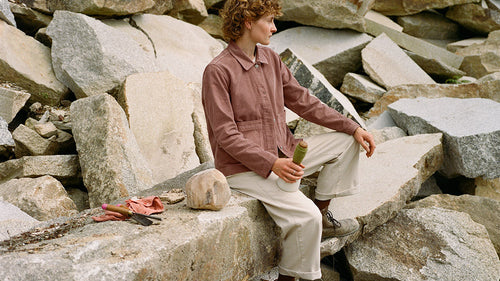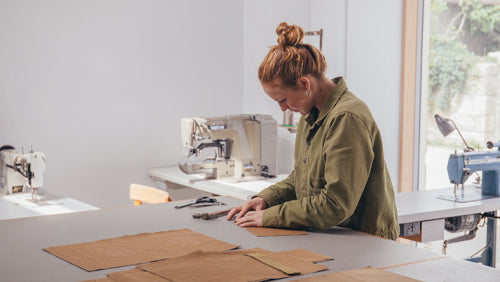This article was originally featured in the Evening Standard. Written by Tess Riley.

‘It all began as a bit of an experiment,’ says Huw Thomas, co-founder of the now cult fashion label Paynter Jacket Co. ‘Our starting point was overproduction and overconsumption in the fashion industry. Could we take our business model in the complete opposite direction and make it work?’
If Huw had his doubts, they were surely alleviated the day one of Paynter’s newly launched jackets sold out online in 86 seconds.
The idea of starting a jacket company was dreamed up on Huw and fiancée Becky Okell’s first date. Shaped by their experiences of working in fashion — Huw for Welsh brand Hiut Denim Co and Becky for Nike in London — the two twenty-somethings wanted to create a business that eliminated the gross volumes of waste by which the fast fashion industry has come to be defined.
Enter Paynter, which makes limited-edition jackets in batches, to order, ensuring that by the time the fabric is cut in the factory it’s already got someone’s name on it.

‘We’re the opposite of an impulse buy,’ says Becky, sitting next to Huw in Paynter’s light-filled Hackney Downs studio. ‘Of the 100 billion or so items of clothing that are churned out globally each year, a fifth might never see the light of day. That system continues because it’s the most profitable. It’s also the most harmful. In contrast, we sell one jacket style once a quarter to a few hundred people at a time, knowing the exact size and colour each customer wants before we start making.’
Faceless brand this is not. Indeed, the people who will wear and care for Paynter jackets are so central to the company’s identity that they bring their customers digitally behind the scenes at every stage of manufacturing.
‘Making to order takes about eight weeks,’ says Huw. ‘Working with a videographer local to our factory, we realised we had a great opportunity to show everyone who’s bought one of our jackets what’s actually happening over that time. You never normally see how a product gets made, by whom, in what conditions. But if you can get someone to be really invested in a product then they’re more likely to care for it.’
Becky and Huw are immensely proud to be creating a blueprint for a better way of producing clothes. But they’re acutely aware that the bigger picture will improve only when more companies start to see doing things the right way as a given, not simply as a marketing stunt.
‘There’s no doubt something needs to change across the industry,’ says Becky.
‘If we can achieve what we have as a tiny brand of two people, we can show others it’s possible.’



